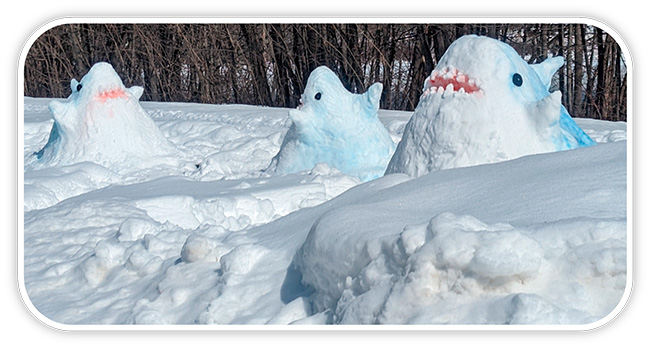DACF Home → Bureaus & Programs → Bureau of Parks and Lands → Discover History & Explore Nature → Sharks
Sharks
Did a winter 2024 snow shark with a QR code bring you to this page?

No matter how you got here, please check out the Sharks of Maine downloadable guide, the shark videos at Sharks4Kids, and then help us spread the word about how important sharks are for keeping oceans healthy, and in turn all of us! Learn how to be Shark Smart during your next beach visit and help spread the word in your neighborhood - Make your own snow shark* and post this Shark Project Page QR Code so others will visit this page. Send a photo of your snow shark by email with Maine Sharks in the subject line to Jocelyn.Hubbell@Maine.gov and you will receive notices about shark programs, educational materials, and news.
*Use food coloring and water in a spray bottle to add color to your shark. Download the QR code, print and laminate, then staple to a stake in the snow next to your shark being sure not to staple through the QR code.
What is a Shark?
Sharks are a type of fish that have a skeleton made of cartilage instead of bone! We call animals with this type of skeleton "elasmobranchs" (eee-las-mo-branks). Other animals in this group include stingrays and skates.
How Many Sharks Are There?
New species are discovered almost every year around the world, but the current number is over 500 species of sharks!
Where Do Sharks Live?
Sharks can be found in every ocean of the world, from the warm tropical waters of the Caribbean to the deep frigid trenches in the arctic ocean. A few can even spend limited time in fresh water!
Why Are Sharks Important?
Sharks play an important role in their respective ecosystems. Larger sharks keep the population of prey species under control, and smaller sharks are an important food source for bigger species. Sharks of all shapes and sizes help to maintain their environments by scavenging on leftovers from other animals. The ocean has evolved with the existence of sharks for nearly 400 million years (that makes sharks older than trees!) A healthy ocean has a healthy abundance of sharks!
Just How Dangerous is a Shark?
The ocean is a shark's home. When we enter the ocean, we are entering their territory. Sharks are wild animals. Unlike dogs and cats, sharks have not evolved alongside humans. Most sharks have never even seen a human!
While humans are not on the shark's menu, sometimes sharks mistake humans for something else, like a seal. However, shark bites are EXTEMELY RARE. You have a better chance of winning the lottery than being bitten by a shark. Although encounters are rare, you should still practice "shark-smart" habits while at the beach to reduce the chances of unwanted contact with a shark.
Be Shark Smart
- Avoid excessive splashing. (Splashing might mimic an injured fish.)
- Avoid wearing shiny jewelry. (Jewelry reflects light like fish scales.)
- Swim, paddle, kayak, and surf with a buddy or in groups.
- Stay close to shore where rescuers can reach you.
- Follow lifeguard instructions, signs, and warning flags.
- Be aware that sharks hunt for seals in shallow water.
- Avoid seals and schools of fish and areas where people are fishing. (It's important to stay away from animals or scents that could attract sharks.)
- Avoid murky or low-visibility water and avoid swimming at dawn and dusk. (It is important to swim where and when you can see what's around you, and with a buddy in case help is needed.)
- Be careful near steep drop-offs and sandbars. (This is where sharks sometimes like to hunt.)
Shark sightings are becoming more frequent in Maine and New England. Learn how to be shark smart this summer while visiting coastal beaches. This video, produced to to raise awareness and help people and white sharks co-exist peacefully, was developed by the Atlantic White Shark Conservancy, the Cape Cod National Seashore, Massachusetts Division of Marine Fisheries, and officials from Cape Cod and South Shore towns.
To learn more about white shark research and to download the Sharktivity App, visit www.atlanticwhiteshark.org